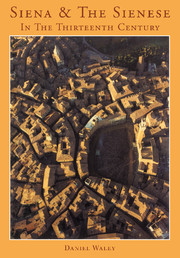Book contents
- Frontmatter
- Contents
- List of illustrations
- List of tables
- Preface
- Acknowledgements
- Glossary
- Abbreviations
- Chronology of principal political events and developments
- 1 Siena
- 1 Setting
- 2 People
- 3 Institutions
- 4 Oligarchy
- 5 Problems
- 6 Religion
- 7 Assumptions
- 8 Revenue
- 9 Expenditure
- 10 Continuity and change
- General Index
- Index of personal names
- Index of places
9 - Expenditure
Published online by Cambridge University Press: 03 December 2009
- Frontmatter
- Contents
- List of illustrations
- List of tables
- Preface
- Acknowledgements
- Glossary
- Abbreviations
- Chronology of principal political events and developments
- 1 Siena
- 1 Setting
- 2 People
- 3 Institutions
- 4 Oligarchy
- 5 Problems
- 6 Religion
- 7 Assumptions
- 8 Revenue
- 9 Expenditure
- 10 Continuity and change
- General Index
- Index of personal names
- Index of places
Summary
The money collected by so many and various means was expended by the commune principally on the assertion of its powers against recalcitrant subjects and hostile neighbours. Certainly the payment of officials was a major routine item and the general expense of administration and bureaucracy, contributions to religious bodies and the extension of the commune's rights were all significant costs. Yet armies and policing usually accounted for a considerably greater sum than all other forms of expenditure combined and it seems likely that there was no year in the later thirteenth century in which this was not the case. Military exigencies had done much to form the commune's institutions and self-awareness and they remained of paramount importance. The obligation to serve in the field was as fundamental as that of serving in the council-chamber and the notion and reality survived of a citizen army, reinforced rather than diluted. Overlordship in the contado could be asserted only with the support of armed force. To survive as a power in the turbulent world of the Tuscan cities Siena had to garrison its own territories and appear potentially threatening to those of its neighbours. Meanwhile the politics of the peninsula drew it into a still wider military network.
It will however be convenient to start with the cost of official salaries, normally the principal non-military item. An analysis of the expenditure recorded in the Biccherna volume for the second half of 1257 suggests that about 8 per cent of the total for that period went on ‘routine’ salaries (omitting extra payments for special tasks).
- Type
- Chapter
- Information
- Siena and the Sienese in the Thirteenth Century , pp. 185 - 204Publisher: Cambridge University PressPrint publication year: 1991



